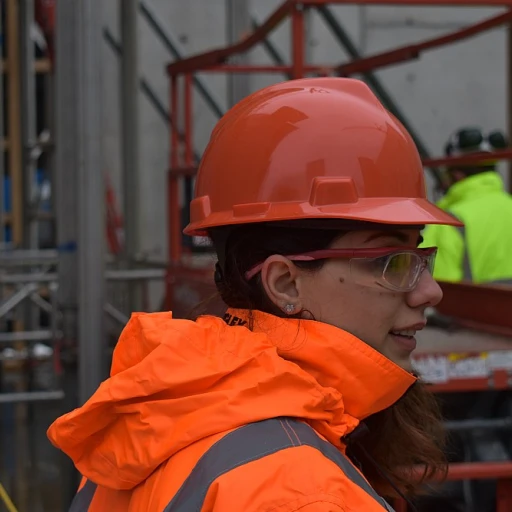
Understanding the Role of HR in Interviews
The Importance of HR in the Interview Process
In the world of talent acquisition, interviews play a crucial role in assessing candidates for a job role. Human resources, often at the heart of this process, will help ensure that the interviews are conducted efficiently and effectively. As companies strive to attract top talent, HR's involvement in preparing and planning interviews becomes a pivotal component of the talent acquisition strategy.
HR professionals coordinate the entire interview process, from initial phone interviews to panel interviews. They help align the interview questions with the job description, ensuring that each candidate is evaluated on relevant skills and their fit within the company's culture. This alignment is essential not only for choosing the right candidate but also for maintaining the integrity and consistency of the interview process.
HR is also responsible for developing best practices for interviews, based on current industry research and trends. This might involve training interview panels on conducting effective interviews or refining the types of questions asked to assess candidate qualifications and problem-solving skills accurately. By standardizing these practices, HR helps to create a fair environment where each interviewee is evaluated consistently.
While HR sets the stage for interviews, they bank on collaboration with hiring managers and other panel members to provide diverse perspectives during the interview process. Hiring managers, possessing in-depth insight into the role and the team dynamic, bring additional layers of evaluation to each candidate’s potential as a future employee.
As the first touchpoint for candidates, HR's role extends beyond interviews to include activities like reference checks and even exit interviews for departing employees. These activities provide a holistic view of the job market and internal company dynamics, continually informing the interview strategies and improvements.
Overall, the diligence of human resources in conducting and refining interviews will help your organization attract, assess, and secure the best talent, reinforcing company culture and ensuring a harmonious fit for both the employee and the organization.
Key Players in the HR Interview Process
Distinguishing the Key Players in the Interview Process
The human resources interview process involves a variety of individuals whose roles and responsibilities are integral to its success. The key players include recruiters, HR managers, hiring managers, and at times, even panel members who come together in the pursuit of securing the best candidates for available positions.
Each member plays a distinctive part. Recruiters often serve as the first point of contact, responsible for screening resumes and conducting initial phone interviews. They ensure candidates meet the basic qualifications and align with the organization's job descriptions. Their early assessments help build a foundation for subsequent interviews.
HR managers bring an additional layer of scrutiny, focusing on organizational fit and company culture. They conduct interviews to evaluate the candidate's soft skills and how well they resonate with team dynamics. Such evaluations can carry substantial weight in final decisions.
Hiring managers, being directly involved in the department where the open position resides, assess the candidate's technical knowledge and specific expertise related to problem-solving skills necessary for the role. Their insights are crucial when considering a candidate's potential to contribute effectively to the team and the company's objectives.
In some cases, companies employ panel interviews as a best practice to ensure a comprehensive review. Panel members from varied backgrounds probe different aspects of a candidate's application through targeted interview questions. This helps in evaluating the candidate's abilities from multiple perspectives.
Each role within this process has unique responsibilities, but together they create a balanced and collaborative approach to examining each candidate's potential. Through structured interviews and reference checks, they strive to uphold the company's standards and ensure successful talent acquisition.
The Recruiter's Role in Interviewing
Highlighting the Recruiter's Expertise During Job Interviews
Recruiters play a critical role in the initial stages of the interview process, serving as the bridge between potential candidates and the company. Their primary responsibility is to effectively assess candidate qualifications, ensuring alignment with the job description. This task involves conducting interviews that delve into the candidate's skills and experience, often beginning with a phone interview to screen potential employees. To evaluate whether candidates possess the necessary skills for the position, recruiters design interview questions that probe into their past work experiences, problem-solving abilities, and adaptability. The goal is to ensure that a candidate not only fits the technical requirements but can also integrate well into the company's culture. In many organizations, recruiters conduct concurrent interviews with other panel members. This panel interview approach allows multiple perspectives to be considered in the assessment of a candidate. The combined efforts of human resources specialists and hiring managers facilitate a thorough evaluation process, ultimately enriching the organization by securing talent that meets strategic needs. A recruiter's involvement extends beyond just conducting interviews. They also manage candidate questions, coordinate interview schedules, and prepare both candidates and panel members with the necessary resources. Additionally, they often conduct reference checks to verify past employment and gather further insights into a candidate's professional behavior. The insights gathered by recruiters during interviews are invaluable in crafting an informed evaluation of a candidate's suitability. By adhering to best practices in talent acquisition, like cultural fit evaluations, recruiters can significantly contribute to the successful onboarding of new employees. Their input not only aids in selecting the right candidate but also in aligning new hires with the organization’s goals and culture, ultimately driving the company forward.HR Managers and Their Interviewing Responsibilities
HR Managers: Guardians of the Interview Process
In the world of talent acquisition, HR managers play a pivotal role in the interview process. Acting as the custodians of company culture and best practices, they ensure that every job interview not only evaluates a candidate's skills but also aligns with the organization's values and needs. HR managers conduct interviews to assess whether potential employees fit the job description while overseeing the overall interview process. When preparing for interviews, HR managers craft interview questions that help gauge a candidate's problem-solving abilities and their potential contribution to the company. These questions are formulated to elicit insights into the job candidate's experience, skills, and fit within the organization. During interviews, HR managers work closely with panel members to maintain consistency across the panel interview process. This consistent approach ensures that every candidate receives a fair chance and that evaluations align with the company's criteria. By focusing on both the candidate's professional qualifications and company culture fit, HR managers will help in selecting candidates who are likely to excel in their roles and contribute positively to the workplace. HR managers also play a role in post-interview processes such as reference checks and exit interviews. These activities provide valuable information about a candidate's past work behavior and reasons for leaving previous jobs, offering deeper insights into the candidate's potential fit in the organization than the interview alone might reveal. Furthermore, HR managers lead the effort in coordinating resources for phone interviews and panel interviews, ensuring that the team has the support they need to conduct a smooth and effective interview process. This includes overseeing the work of recruiters and ensuring that everyone involved in the process is equipped with the right tools and knowledge to make well-informed hiring decisions. In summary, HR managers are central to orchestrating a robust and fair interview process that aligns with the company's strategic goals for talent acquisition.Involving Hiring Managers in the Interview Process
Engaging Hiring Managers in the Interview Process
Incorporating hiring managers in the interview process is essential for evaluating candidates effectively. Their direct involvement not only leverages their expertise related to the role but also ensures alignment with the job description and company culture. This collaboration between human resources and hiring managers creates a more comprehensive view of prospective employees. When hiring managers engage in interviews, they often bring valuable perspectives to candidate assessment. For instance, they may focus on job-specific skills and problem-solving capabilities that are crucial for the role. By addressing targeted interview questions, hiring managers can gauge whether a candidate's skills match the organizational needs and projects they'll be handling. Bringing hiring managers into the mix further enhances the accuracy of candidate evaluation. This approach ensures they are not only assessing technical skills but also evaluating cultural fit. A candidate who aligns well with the company culture is more likely to integrate smoothly into their work environment, boosting both short and long-term success. Hiring managers' participation in interviews promotes a well-rounded interview panel. Collaborating with HR helps refine the candidate selection process, as it combines different perspectives and skills. This collaborative approach is widely regarded as one of the best practices for effective ongoing talent acquisition. Ultimately, the inclusion of hiring managers in candidate interviews allows for a more holistic review of talent. Their direct interaction with candidates helps build rapport and offer insights into daily responsibilities. This involvement, coupled with feedback from other panel members in panel interviews or reference checks, will help the organization make informed hiring decisions, enriching the team's skills and enhancing overall company performance.Collaborative Interviewing: A Team Approach
Team-Based Interviewing: Harnessing Collective Insight
In the dynamic landscape of talent acquisition, a collaborative approach to interviewing can be a game-changer. By involving multiple stakeholders in the interview process, companies can leverage diverse perspectives to make more informed hiring decisions. This method not only enriches the interview but also aligns with the company culture, ensuring that new hires are a good fit for the organization.
Implementing a panel interview, where a group of panel members conducts the interview together, is a practical application of this approach. Each panel member brings unique insights and questions, which can help assess candidate skills comprehensively. This method allows for a well-rounded evaluation of candidates, as different interviewers may focus on various aspects such as technical skills, problem-solving abilities, and cultural fit.
Collaborative interviewing also involves the strategic participation of HR managers, recruiters, and hiring managers. While HR managers focus on organizational alignment and company policies, recruiters can provide insights into the job description and candidate expectations. Hiring managers, on the other hand, are crucial for evaluating the candidate's potential to meet the specific demands of the role.
To optimize this process, it is essential to prepare thoroughly. Establish clear interview questions that align with the job description and company goals. This preparation will help ensure that the interview panel remains focused and efficient, respecting the candidate's time and the company's resources.
Furthermore, involving multiple stakeholders in the interview process can enhance the candidate experience. It demonstrates the company's commitment to a thorough and fair hiring process, which can positively impact the organization's reputation. Candidates often appreciate the opportunity to interact with potential colleagues and gain a better understanding of the company culture.
Ultimately, a team-based approach to interviewing can significantly improve the quality of hires. By drawing on the collective expertise of a diverse panel, companies can make more informed decisions, reducing the likelihood of costly hiring mistakes. This strategy not only benefits the organization but also supports the candidate's journey, ensuring a smoother transition into their new role.





